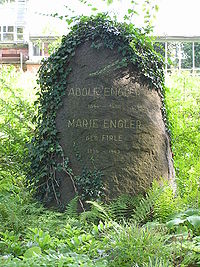- Adolf Engler
-
Adolf Engler 
Engler's grave marker at the Berlin Botanical GardenBorn March 25, 1844
Sagan, PrussiaDied October 10, 1930
Berlin, GermanyNationality German Fields Botany, plant taxonomy Institutions Botanical Institute of Munich
University of Kiel
University of BerlinAlma mater University of Breslau Known for Die Natürlichen Pflanzenfamilien Heinrich Gustav Adolf Engler (March 25, 1844 – October 10, 1930) was a German botanist. He is notable for his work on plant taxonomy and phytogeography, like Die Natürlichen Pflanzenfamilien (The natural plant families), edited with Karl A. E. von Prantl.
Even now, his system of plant classification, the Engler System, is still used by many herbaria and is followed by writers of many manuals and floras. It is still the only system that treats all 'plants' (in the wider sense, algae to flowering plants) in such depth.[1]
Engler published a prodigious number of taxonomic works. He used various artists to illustrate his books, notably Joseph Pohl (1864–1939), an illustrator who had served an apprenticeship as a wood-engraver. Pohl's skill drew Engler's attention, starting a collaboration of some forty years. Pohl produced more than 33 000 drawings in 6 000 plates for Die naturlichen pflanzenfamilien. He also illustrated Das pflanzenreich (1900–1953), Die pflanzenwelt Afrikas (1908–1910), Monographien afrikanischer pflanzenfamilien (1898–1904) and the journals Engler's Botanische jahrbucher.[2]
He received the Linnean Medal in 1913. The International Association for Plant Taxonomy (IAPT) established the Engler Medal in his honour in 1986, to be awarded for outstanding contributions to plant taxonomy (see the list of Engler Medal awards).
The journal Englera (ISSN 0170-4818) published by the Berlin-Dahlem Botanical Garden, Germany is also named after him. Many genera (in various 'plant' groups) are named in his honour, such as Englerastrum, Englerella, Engleria, Englerina, Englerocharis, Englerodaphne, Englerodendron and Englerophytum.
Contents
Biography
Adolf Engler was born on March 25, 1844 in Sagan, Prussia, now Żagań, in western Poland as "Heinrich Gustav Adolf Engler", and died in Berlin, Germany, on October 10, 1930).
He studied and obtained a Ph.D. from the University of Breslau (now Wrocław, Poland) in 1866. After some years of teaching he became, in 1871, custodian of botanical collections of the Botanische Institute der L.M.U. München (Botanical Institute of Munich), remaining there until 1878, when he accepted a professorship at the University of Kiel, wherein he stayed until 1884 teaching Systematic Botany. Also in 1878, Engler was elected into Leopoldina, German Academy of Natural History. He went back to Breslau in 1884, as director of the Botanical Garden, succeeding Goeppert, and appointed professor of Botany at University of Breslau. From 1889 to 1921 Engler was professor at University of Berlin, and director of the Berlin-Dahlem Botanical Garden, transforming it into one of the greatest botanical gardens of the world.
He visited several regions of the world, enlarging the knowledge of floristic distribution, especially of Africa.
Works
Plant taxonomy works
Besides his important work in General Plant Taxonomy, he was also an expert in some taxa such as Saxifraga, Araceae, Burseraceae and others.
Adolf Engler collaborated with several other great botanists, including Alphonse de Candolle on the Monographiae Phanerogamarum (Monographs of flowering plants), and C.F.P. von Martius on the monumental work Flora Brasiliensis (Flora of Brazil).
He founded the journal Botanische Jahrbücher für Systematik, Pflanzengeschichte und Pflanzengeographie (Botanical yearbook for systematics, plant phylogeny and phytogeography; ISSN 0006-8152), published in Leipzig, Germany, which has continued in publication since 1881 up to the present. In 2010 this publication changed its name to Plant diversity and evolution: Phylogeny, biogeography, structure and function; ISSN 1869-6155.
- Die Natürlichen Pflanzenfamilien (The natural plant families), edited with Karl A. E. Prantl, with the collaboration of many notable experts, 1887–1915, 23 volumes. This enormous series is one of the very few detailed works (since Linnaeus) to attempt the classification of 'plants' from algae to flowering plants, and constitutes an invaluable work. A second, incomplete edition is being produced (starting in 1924, latest release 1995 by Duncker und Humblot Verlag, Berlin) [1].
- Das Pflanzenreich (The plant kingdom), with the collaboration of many notable experts, 1900-1968. This is a monographic series on the plant kingdom that is presently incomplete [1].
- Syllabus der Pflanzenfamilien, in the 12th ed., edited by H. Melchior & E. Werdermann, with the collaboration of many notable experts, 1954-1964. This is the most recent summary of the Engler System and gives descriptions of the higher taxonomic levels. In two volumes [1]
Phytogeographic works
He was one of the pioneers in this field of science, highlighting the importance of factors like geology on biodiversity, and defined Biogeographical Regions in 1879.
- Vegetation der Erde (Vegetation of the earth) 1896, with O. Drude.
- Die pflanzenwelt Ost-Afrikas und der nachbargebiete (The plant world of Eastern Africa and the adjacent regions) , 1895 (available at Botanicus.org)
See also
- Biogeographic Regions
- Engler System
- List of plants of Caatinga vegetation of Brazil
- List of plants of Cerrado vegetation of Brazil
- Phylogenetic System
References
- ^ a b c d Woodland, Dennis W. (1997). Contemporary Plant Systematics (2nd ed.). Andrews University Press. ISBN 1883925142.
- ^ 10. about the illustrators and illustrations
- ^ "Author Query". International Plant Names Index. http://www.ipni.org/ipni/authorsearchpage.do.
- (German) Lack, Hans Walter (2000). Botanisches Museum Berlin: Adolf Engler—Die Welt in einem Garten (The world in a garden). München, Germany: Prestel. ISBN 3-7913-2315-6.
External links
- Botanische Jahrbücher für Systematik, Pflanzengeschichte und Pflanzengeographie
- Englera
- View digitized titles by Adolf Engler in Botanicus.org
- Author Query Results and Plant Name Query Results for Adolf Engler at the International Plant Names Index. Retrieved on March 25, 2008.
Categories:- Botanists with author abbreviations
- 1844 births
- 1930 deaths
- German botanists
- German taxonomists
- German phytogeographers
- Botanists active in Africa
- People from the Province of Silesia
- University of Breslau alumni
- University of Kiel faculty
- Humboldt University of Berlin faculty
- People from Żagań
- Fellows of the Leopoldina
Wikimedia Foundation. 2010.

